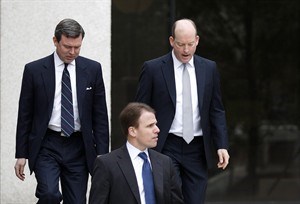
Lamar McKay, former president of BP America and current chief executive of BP's Upstream unit, leaves Federal Court after testifying in New Orleans, Monday, Feb. 25, 2013. McKay testified Tuesday that BP and its contractors share responsibility for preventing blowouts like the Macondo well blowout and rig explosion off Louisiana that killed 11 workers on April 20, 2010, spawning the massive spill. (AP Photo/Bill Haber)
February 28, 2013 - 12:24 PM
NEW ORLEANS - An internal BP probe of the 2010 oil spill in the Gulf of Mexico didn't explore whether upper-level management had a role in causing the disaster because investigators didn't have access to its partners' employees and records, a BP executive testified Thursday at a trial designed to assign blame to the companies.
Mark Bly, who led the investigation and has served as BP's global head of safety, said his team didn't have enough information to conduct a "systemic evaluation" of what caused the blowout of BP's Macondo well without co-operation from rig owner Transocean Ltd. or other companies that worked on the project.
A report by Bly's team in September 2010 focused on mistakes that rig workers made before the blowout triggered an explosion that killed 11 workers and led to the nation's worst offshore oil spill.
A BP policy says accident investigations should include attempts to identify any "systemic failures within the management system." Bly, however, said he and then-BP chief executive Tony Hayward got an exception to the policy and decided at the outset not to attempt a broader probe. Bly didn't explain how they got the exception.
"We're tasked with getting to the answer as quickly as we could, and trying to get to a position where we felt we could make good recommendations," he said. "Having done that, we did have the option to try to go further, but at that point in time, given the limitation that we've touched on, it would have been very, very difficult to do that."
In what has become known as the "Bly Report," BP took some responsibility for the web of errors and failures that led to the disaster but also assigned plenty of blame to its partners. In earlier testimony, Bly said the investigation wasn't intended to look at the disaster through the "lens of responsibility."
While questioning Bly on Wednesday, plaintiffs' attorney Paul Sterbcow read aloud from the report and asked him about its eight "key findings." One of those said BP rig supervisors and Transocean crew members botched a crucial safety test that should have showed them a blowout was brewing.
"It was an important test and it was misinterpreted," Bly said.
Robert Kaluza and Donald Vidrine, the BP well site leaders accused of misinterpreting those test results, have been indicted on manslaughter charges and await a separate trial.
Attorneys for the U.S. government and lawyers for Gulf Coast residents and businesses have accused BP of putting profits ahead of safety on a project that was over budget and behind schedule.
Kevin Lacy, who served as BP's senior vice-president for drilling operations in the Gulf and resigned just before the spill, testified that he felt "tremendous pressure" to cut costs. He said BP slashed between $250 million and $300 million from its Gulf drilling budget from 2008 to 2009 while at the same time its production rose by more than 50 per cent.
Sterbcow asked Bly if "cost-cutting pressure" and the company's safety culture should have been part of BP's probe.
"It depends on what the investigation led you to," Bly said.
BP has said drilling in the Gulf is a team effort and its partners should share in the responsibility for the disaster. The trial is designed to assess the fault of each company involved, and billions of dollars are at stake.
Earlier this week, University of California-Berkeley engineering professor Robert Bea testified that BP didn't implement a 2-year-old safety management program on the Deepwater Horizon before the explosion.
Sterbcow asked Bly if he agreed that BP's implementation of the new system was an "absolute disaster."
"No, sir, I wouldn't agree with that," Bly said. "I can speak to many positive things that were in place."
___
Follow Kunzelman at https://twitter.com/Kunzelman75
News from © The Associated Press, 2013